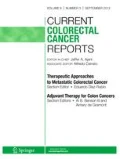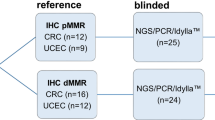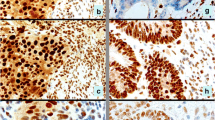Abstract
Referrals to genetics services are becoming increasingly common for patients who are diagnosed with early-onset colorectal cancer (CRC) or patients who have a family history of CRC. Microsatellite instability (MSI) testing and immunohistochemical analysis (IHC) of the patient’s tumor tissue, which assess indirectly the cellular status of DNA mismatch repair, have proven important tools for geneticists and genetic counselors to determine whether or not these individuals may be at risk for an inherited cancer syndrome, Lynch syndrome (a subset of hereditary nonpolyposis colorectal cancer). The application of tumor MSI/ IHC also extends to the group of providers involved in the diagnosis and management of CRC, demonstrating the growing clinical applicability of MSI/IHC testing. This review discusses the clinical utility of MSI/IHC analysis, including its benefits and limitations, and addresses some of the current debates surrounding testing.
Similar content being viewed by others
References and Recommended Reading
Lynch HT, de la Chapelle A: Hereditary colorectal cancer. N Engl J Med 2003, 348:919–932. This is a good current, comprehensive review of hereditary colon cancer. It highlights the important clinical features associated with HNPPC/Lynch syndrome including diagnosis, testing, and management of the disease.
Vasen HFA, Boland CR: Progress in genetic testing, classification, and identification of Lynch syndrome. JAMA 2005, 293:1979–1986. This review article presents a nice history of the discovery and continual characterization of Lynch syndrome as well as the development of the screening and testing techniques used for its detection.
Vasen HFA, Mecklin J-P, Khan PM, Lynch HT: The international collaborative group on hereditary nonpolyposis colorectal cancer. Dis Colon Rectum 1991, 34:424–425.
Baudhin LM, Burgart JL, Leontovich O, Thibodeau SN: Use of microsatellite instability and immunohistochemistry testing for the identification of individuals at risk for Lynch syndrome. Familial Cancer 2005, in press.
Lindor NM, Rabe K, Petersen GM, et al.: Lower cancer incidence in Amsterdam-I criteria families without mismatch repair deficiency. Familial colorectal cancer type X. JAMA 2005, 293:1986–2028.
Watson P, Lynch HT: Cancer risk in mismatch repair gene mutation carriers. Fam Cancer 2001, 1:57–60.
Aaltonen LA, Salovaara R, Kristo P, et al.: Incidence of hereditary nonpolyposis colorectal cancer and the feasibility of molecular screening for the disease. N Engl J Med 1998, 338:1481–1487.
Cunningham JM, Kim C, Christensen ER, et al.: The frequency of hereditary defective mismatch repair in a prospective series of unselected colorectal carcinomas. Am J Hum Genet 2001, 69:780–790. This study of 257 unselected colorectal cancer cases demonstrated the relatively small proportion of hereditary cases among those displaying an MMR deficiency by MSI/IHC. Those not associated with germline mutations were attributed to somatic hypermethylation of the hMLH1 gene.
Gazzoli I, Loda M, Garber J, et al.: A hereditary nonpolyposis colorectal carcinoma case associated with hypermethylation of the MLH1 gene in normal tissue and loss of heterozygosity of the unmethylated allele in the resulting microsatellite instability-high tumor. Cancer Res 2002, 62:3925–3928.
Cunningham JM, Christensen ER, Tester DJ, et al.: Hypermethylation of the hMLH1 promoter in colon cancer with microsatellite instability. Cancer Res 1998, 58:3455–3460.
Miyakura Y, Sugano K, Konishi F, et al.: Extensive methylation of hMLH1 promoter region predominates in proximal colon cancer with microsatellite instability. Gastroenterology 2001, 121:1300–1309.
Kuismanen SA, Holmberg MT, Salovaara R, et al.: Genetic and epigenetic modification of MLH1 accounts for a major share of microsatellite-unstable colorectal cancers. Am J Pathol 2000, 156:1773–1779.
Wang L, Cunningham JM, Winters JL, et al.: BRAF mutations in colon cancer are not likely attributable to defective DNA mismatch repair. Cancer Res 2003, 63:5209–5212.
Domingo E, Laiho P, Ollikainen M, et al.: BRAF screening as a low-cost effective strategy for simplifying HNPCC genetic testing. J Med Genet 2004, 41:664–668. This study demonstrated that the somatic BRAF V600E mutation is negatively correlated with germline mutations in hMLH1 and hMSH2. The BRAF V600E mutation positively correlates with somatic hMLH1 promoter hypermethylation.
Rodriguez-Bigas MA, Boland MA, Hamilton CR, et al.: National Cancer Institute workshop on hereditary nonpolyposis colorectal cancer syndrome: meeting highlights and Bethesda guidelines. J Natl Cancer Inst 1997, 89:1758–1762.
Salovaara R, Loukola A, Kristo P, et al.: Population-based molecular detection of hereditary nonpolyposis colorectal cancer. J Clin Oncol 2000, 18:2193–2200.
Hampel H, Frankel WL, Martin E, et al.: Screening for the Lynch syndrome (hereditary nonpolyposis colorectal cancer). N Engl J Med 2005, 352:1851–1860. This study genotyped 1066 consecutive unselected patients with CRC in order to determine the frequency of germline MMR mutations in this population of patients and subsequently the best approach for identifying these patients. The results of this study are among the first to support screening of all individuals with a diagnosis of CRC for Lynch syndrome, regardless of family history.
Kievit W, de Bruin JHFM, Adang EMM, et al.: Cost effectiveness of a new strategy to identify HNPCC patients. Gut 2005, 54:97–102.
Umar A, Boland CR, Terdiman JP, et al.: Revised Bethesda guidelines for hereditary nonpolyposis colorectal cancer (Lynch syndrome) and microsatellite instability. J Natl Cancer Inst 2004, 96:261–268. The original Bethesda guidelines created in 1996 were revisited in 2002 and new guidelines were created, as described in this article. These guidelines represent the standard of care for the consideration of MSI/ IHC testing in individuals who may be at risk for Lynch syndrome.
Aaltonen LA, Peltomaki P, Leach FS, et al.: Clues to the pathogenesis of familial colorectal cancer. Science 1993, 260:812–816.
Weber JL: Informativeness of human (dC-dA)nþ(dG-dT)n polymorphisms. Genomics 1990, 7:524–530.
Boland CR, Thibodeau SN, Hamilton SR, et al.: A National Cancer Institute workshop on microsatellite instability for cancer detection and familial predisposition: development of international criteria for the determination of microsatellite instability in colorectal cancer. Cancer Res 1998, 58:5248–5257.
Thibodeau SN, French AJ, Cunningham JM, et al.: Microsatellite instability in colorectal cancer: different mutator phenotypes and the principal involvement of hMLH1. Cancer Res 1998, 58:1713–1718.
Dietmaier W, Wallinger S, Becker S, et al.: Diagnostic microsatellite instability: definition and correlation with mismatch repair expression. Cancer Res 1997, 57:4749–4756.
Wagner A, Hendriks Y, Meijers-Heijboer EJ, et al.: Atypical HNPCC owing to MSH6 germline mutations: analysis of a large Dutch pedigree. J Med Genet 2001, 38:318–322.
Peltomaki P, Vasen H: Mutations associated with HNPCC predisposition: update of ICG-HNPCC/INSiGHT mutation database. Dis Markers 2004, 20:269–276.
Pinol V, Castells A, Andreu M, et al.: Accuracy of revised Bethesda guidelines, microsatellite instability, and immunohistochemistry for the identification of patients with hereditary nonpolyposis colorectal cancer. JAMA 2005, 293:1986–1994.
Baudhin LM, Mai M, French A, et al.: Analysis of hMLH1 and hMSH2 gene dosage alterations in hereditary nonpolyposis colorectal cancer patients by novel methods. J Mol Diagn 2005, 7:226–235.
Casey G, Lindor NM, Papadopoulos N, et al.: Conversion analysis for mutation detection in MLH1 and MSH2 in patients with colorectal cancer. JAMA 2005, 293:799–809.
Kakar S, Burgart LJ, Thibodeau SN, et al.: Frequency of loss of hMLH1 expression in colorectal carcinoma increases with advancing age. Cancer 2003, 97:1421–1427.
Lindor NM, Burgart LJ, Leontovich O, et al.: Immunohistochemistry versus microsatellite instability testing in phenotyping colorectal tumors. J Clin Oncol 2002, 20:1043–1048. This study evaluated the efficacy of IHC analysis in predicting MSI in CRC tumors. Results of IHC successfully predicted an MSI-H phenotype 100% of the time and an MSI-L/MSS phenotype 97% of the time, demonstrating a slightly higher specificity for MSI than sensitivity.
Ribic CM, Sargent DJ, Moore MJ, et al.: Tumor microsatelliteinstability status as a predictor of benefit from fluorouracilbased adjuvant chemotherapy for colon cancer. N Engl J Med 2003, 349:247–257.
Gill S, Goldberg RM: New developments in therapy for colorectal cancer. Curr Oncol Rep 2003, 5:183–191.
Author information
Authors and Affiliations
Rights and permissions
About this article
Cite this article
Thomas, B.C., Thibodeau, S.N. & Lindor, N.M. Clinical significance of tumor microsatellite instability and immunohistochemistry for mismatch repair deficiency in colorectal cancers. Curr colorectal cancer rep 1, 103–109 (2005). https://doi.org/10.1007/s11888-005-0006-3
Issue Date:
DOI: https://doi.org/10.1007/s11888-005-0006-3




